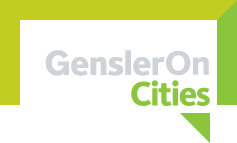The Case for Space as Education Shifts the Frame
 Ashley Marsh
Ashley Marsh
The U.S. workforce has undergone a significant shift in recent years. People change jobs roughly every 4.2 years, according to the most recent data from the Bureau of Labor Statistics. It’s predicted that 43 percent of the U.S. workforce will be freelancers by 2020.
Today, we’re watching an American economy prepare for a liquid workforce, creating “highly adaptable and change-ready enterprise environments” where qualities such as ‘ability to quickly learn’ or ‘shift gears’ rank higher with prospective employees than ‘deep expertise for the specialized task at hand.’ To prepare our young people for this significant shift, in recent years innovators in education have been responding.
“Workplace revolution?” wrote Allison Arieff in Dialogue 24, “now it’s education’s turn.” We couldn’t agree more.
Just as Gensler’s pioneering studies have helped align the design of the modern workplace to this shifting workforce for decades, Gensler has been amassing a significant body of knowledge, which has informed how we have been preparing for education’s turn. Why? Despite pedagogy and curricular innovations, most learning environments remain connected to an industrial model that fails to support the diverse spectrum of their needs. Focus remains on universal furniture provisions, buildings designed on a square-foot-per-student allocation metric, and a procurement and delivery method that can’t keep up with education’s pace of change.
We think the lens is most unique when focused on young learners and we’ve paid close attention to one trend in particular: learner-centric experiences. We’ve spent hundreds of hours observing how students in these settings (often labeled as personalized, or self-directed, education models) engage with their environments. We asked ourselves, “As students gain freedom to curate their day, what value does a compartmentalized classroom space hold?”
Designing a balanced environment that supports student choice and a spectrum of activities simultaneously is tricky. The exemplar and leading-edge learning environments supporting this trend, such as those at AltSchool, Summit Public Schools and d.tech, are still falling short. There are unprecedented implications for the design of learning environments if we want them to authentically support education as it shifts the frame.
In an effort to tackle this challenge, we’re leading a multi-year research study conducted in collaboration with Silicon Schools Fund. From the study’s early insights, we identified support for mode-shifting, focusing and redefined spatial zoning as primary needs. Tension between autonomy and acoustics is another arena we are exploring, along with the power of the prototype to ponder.
We’re continuing to push our research to explore additional ways to improve alignment between environment and learners. One of our key partners in this research is Summit Public Schools, a leading charter management organization serving diverse communities in the San Francisco Bay Area and Washington State. Summit is one of K-12 education’s most renowned reinvention stories. A few years back, they significantly advanced their commitment to personalized learning by developing a unique digital platform, in collaboration with Facebook, to host a student’s Personalized Learning Plan (PLP). When they did this, they also began to reinvent their learning environments in an effort to improve alignment. And as they continue to open new and advance their existing campuses, they continue to ask how their learning environments can be even better.
We’re excited to be a part of what’s next.
 |
Ashley Marsh, Associate, AIA, is a consulting project strategist in Gensler’s San Francisco office. Ashley is driven to translate spatial implications of our rewired culture of life, learning and play and works across a full spectrum of education, creative and not-for-profit organizations. Contact her at Ashley_Marsh@gensler.com. |


